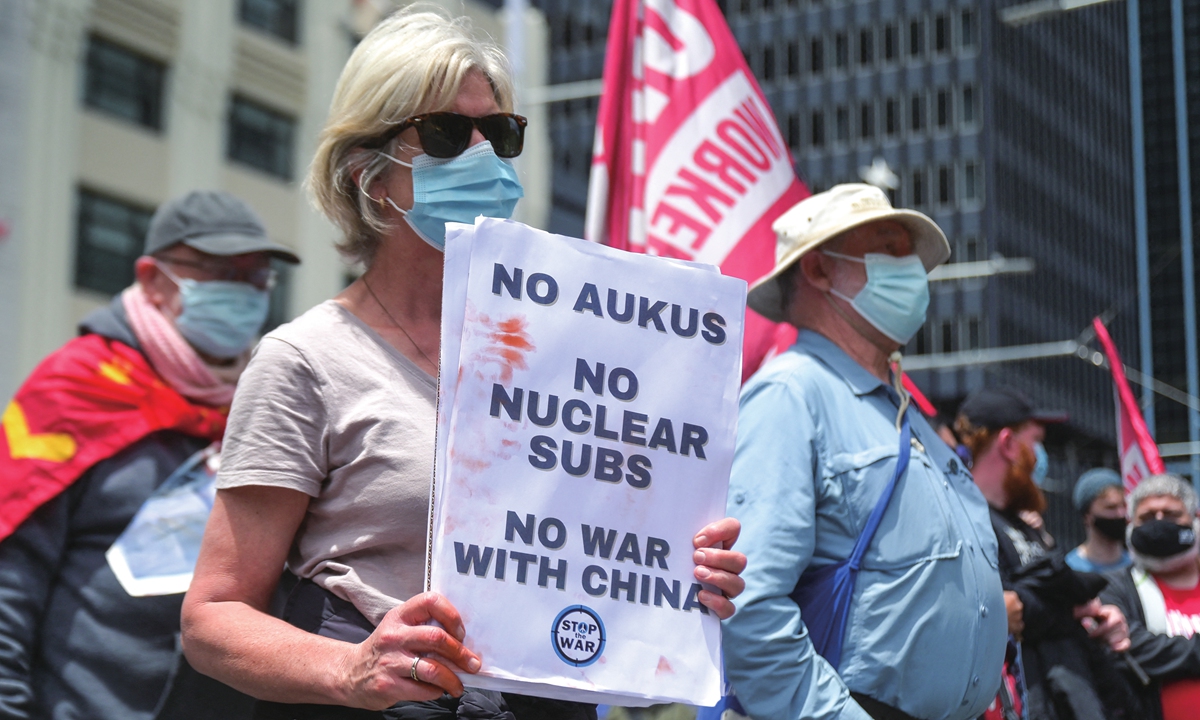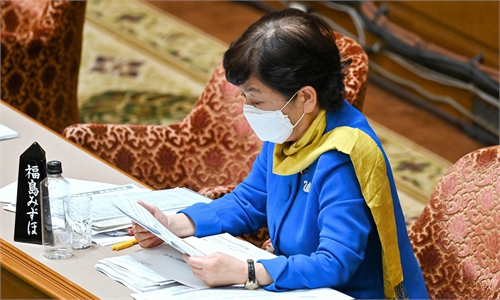
Members of the Sydney Anti-AUKUS Coalition (SAAC) participate in a protest in Sydney, Australia, on December 11, 2021. Photo: AFP
The defense ministers of the US, UK and Australia will reportedly begin to talk about broadening the AUKUS military alliance, with Japan emerging as the leading candidate for inclusion. However, analysts warned that such an alarming move marks the pact further turning into an "Asian NATO," raising concerns over heightened militarism in Japan and potential destabilization in the region.
The expansion of AUKUS would be on "pillar two," which commits the members to jointly developing quantum computing, undersea, hypersonic, artificial intelligence and cyber technology, the Financial Times reported on Saturday.
Japan is seen as the first candidate to join in the pact. According to a Reuters report on Sunday, US President Joe Biden and Japanese Prime Minister Fumio Kishida "will likely" discuss expanding AUKUS to include Japan during their summit in Washington on Wednesday.
In disregard of the concerns of regional countries and the international community over the risk of nuclear proliferation, the US, the UK and Australia have kept sending signals of AUKUS expansion, co-opting some countries to come on broad, and escalating arms race in the Asia-Pacific to the detriment of peace and stability in the region. China is gravely concerned about it, Chinese Foreign Ministry spokesperson Mao Ning said at a press conference on Monday.
"We oppose relevant countries cobbling together exclusive groupings and stoking bloc confrontation," the spokesperson said, pointing out that Japan in particular needs to earnestly draw lessons from history and stay prudent on military and security issues.
The US, UK and Australia have long been mulling expanding the AUKUS alliance to include more countries. While the "first pillar" of the pact, involving the provision of nuclear-powered attack submarines to Australia, has raised concerns over nuclear proliferation, the US has been pushing to invite more countries to join in "pillar two" with the purpose of enhancing AUKUS' influence, serving the goal of implementing its Indo-Pacific strategy and maintaining its hegemony, Xiang Haoyu, a research fellow at the China Institute of International Studies, told the Global Times on Monday.
Moreover, by encouraging more countries such as South Korea and the Philippines to join AUKUS and other US-led small cliques, the US aims to create various coalitions to besiege China. These efforts are made with a purpose of gaining an upper hand in the strategic competition with China, said Xiang.
The expert noted that Japan has been the prime candidate for inclusion in AUKUS, given its longstanding alliance with the US, advanced technology and position in the global industrial chain. Additionally, it has played an active role in cooperating with the US on its Indo-Pacific strategy.
Japan also has its own motivations for joining the pact, Xiang said, noting that Prime Minister Kishida's cabinet has been actively pursuing increased arms exports to spur domestic defense industry and enhance military capabilities.
Chen Hong, director of the Australian Studies Center of East China Normal University, said that in recent years, Japan has continuously attempted to breach the constraints of its pacifist constitution and views potential inclusion in AUKUS as an opportunity to further this agenda.
Facing a crisis of trust domestically, Kishida also expects to bolster public support by strengthening his defense and foreign policies, Chen told the Global Times, referring to Kishida's upcoming meetings with US President Biden and Philippine President Ferdinand Romualdez Marcos in Washington as well as Japan's participation in joint military exercises with the US, Australia and the Philippines.
Chen warned that Japan's potential entry into AUKUS is concerning, as it could further foment militarism within Japan. Moreover, it could lay the groundwork for the expansion of the military alliance into an Asian equivalent of NATO, raising further alarm over regional security.
The establishment and subsequent expansion of AUKUS have raised significant concerns among regional countries, particularly regarding nuclear proliferation. Analysts said that despite attempts by member states to portray it in positive light, the military alliance is an exclusive clique rooted in Cold War mentality.
Together with other smaller coalitions led by the US, AUKUS could also exacerbate the risks of arms races and confrontations in the region, particularly when it interferes in heated issues such as those in the South China Sea or the Taiwan question, analysts warned.


